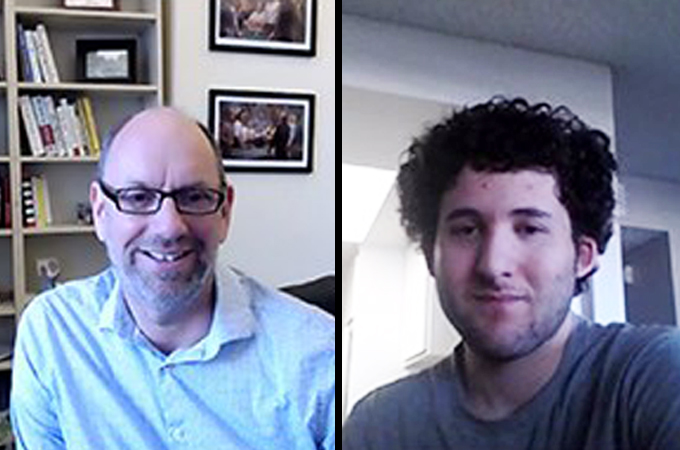Over the past 20 years, social scientists have noticed an increased mortality rate among a specific demographic in the United States—middle aged, high school educated, non-Hispanic white men. In order to explore this phenomenon, Professor Greg Thorson, who holds the Ken and Lynn Hall Endowed Chair of Public Policy at the U of R, and College of Arts and Sciences undergraduate Edison Forman ’21 recently coauthored a study and presented their findings during a virtual talk, “Drugs, Depression, and Death: The New Politics and Policies of Despair.”
The event, part of the Hall Network for Innovation and Policy virtual Brown Bag Speaker Series, was introduced by School of Education Professor Andrew Wall, who also moderated the conversation. The Hall Network is made possible through the support of Ken Hall ’60 and Lynn Hall.
Thorson explained some of the research: “Even before the pandemic, we saw a marked increase in mortality for a major demographic that resulted in a rise in death rates among non-Hispanic white men. We’re seeing a lot of drug and alcohol poisoning, opioid addiction, record levels of suicide, and high levels of chronic illness.”
These afflictions, Thorson noted, are the telltale signs of what have become known as deaths of despair. Many causal factors are at play in this trend, including a worsening labor market from a disintegration of manufacturing jobs; the tension between social privilege and economic disadvantage; and other aspects of gender, race, and age.
And health issues aren’t the only result. Thorson and Forman wondered: What are the political consequences of this despair? “For those who survive and live, it also affects their political behavior, party identifications, and issue positions,” said Thorson. “Part of that was expressed in support for Trump in 2016—that type of anger and those issue positions will impact politics and policy for years to come.”
Throughout their presentation, the pair—who will present their research at two virtual political science conferences next month—touched on data points that illustrate how white men have increasingly identified as politically conservative, while dramatically losing overall confidence in Congress and the press. These changes were further catalyzed by the election of former President Donald Trump in 2016.
The long-term impact of this phenomenon is already being witnessed in grievance politics and events such as the January 6 insurrection at the Capitol. “Things have been getting more hyper-partisan for a while, but it has reached a fever pitch,” Forman said. “This demographic’s move toward the conservative side of politics just increases the gap between them and everyone else.”
While other researchers have drawn international parallels, Thorson and Forman believe these deaths of despair have been relatively unique to populations in the United States. Forman noted that, unlike the United States, the United Kingdom regulates the number of painkillers people can buy in one package, and suicide rates in China and East Asia have dropped as a result of social progress.
Unfortunately, some of the underlying factors of the trends in the United States, such as automation and global trade, are here to stay. Thorson and Forman believe American political extremism will continue to grow if its causes are not addressed on a fundamental level. “There are things that policymakers can do—they’re not easy but they’re possible,” Forman said. “We have to address the despair and its outcomes at the same time … They have to be mitigated by making the lower class substantially better off through policy.”
Thorson added, “The social safety net in the U.S. is more holes than net. We need a dramatic increase in the amount of government aid.”
Learn more about the Hall Network and studying political science or public policy at the University of Redlands.






